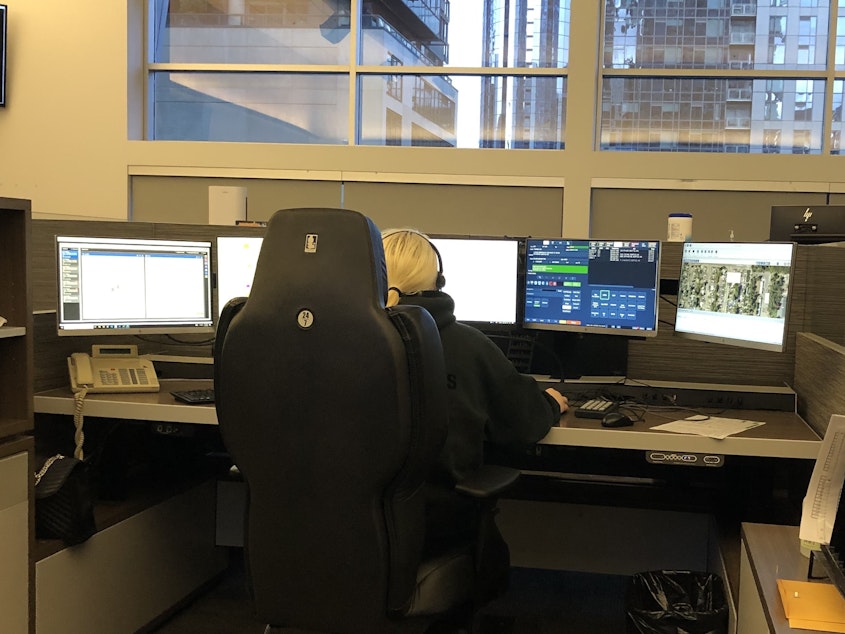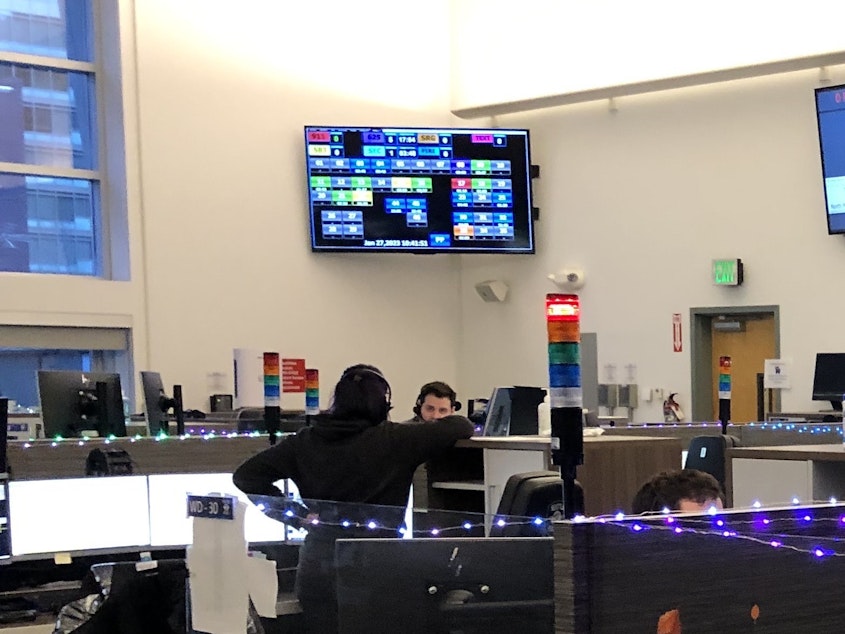Seattle to launch civilian-based 911 response team in 2023

Seattle is testing a big change in its 911 response. The city plans to add a team of civilian mental health professionals to its 911 center later this year.
It’s a small pilot project that's part of a move away from traditional police responses for certain emergencies.
If you call 911 in the city of Seattle, chances are your call goes to a large room in the Seattle Police Department’s West Precinct downtown. Call-takers sit before an array of monitors on one side of the room. They forward information on calls requiring a Seattle police response to dispatchers talking on the radio on the other side of the room.
It’s the largest call center in the Pacific Northwest, receiving up to 900,000 calls per year — and the room is surprisingly quiet. Operations manager Jacob Adams said that’s intentional.
“A 911 center is like a glorified library, it’s like ‘Shh!’ And the main reason is because we’ve got to listen,” he said.

While the call center is housed in a police station, it’s a separate agency. City officials announced that change in 2020, after protesters called for more non-police responders. The Community Safety and Communications Center was officially formed in 2021. Adams said call-takers forward many calls to the Seattle Fire Department, which operates its own call center, or refer others to non-emergency resources.
Sponsored
But he said traditionally, the only personnel that dispatchers can send directly into the field are police officers. Now the 911 call center is preparing to broaden its mission by dispatching its own civilian responders to certain calls.
“Essentially we triage an abundance of calls. So there’s a lot of options that are there,” Adams said. “Currently as far as responders, we only have the police. But that’s what the city’s working on, is creating those alternative response groups. So stay tuned.”
Seattle's budget includes $2.7 million over the next biennium to pilot a civilian-led response to certain calls “with a mental/behavioral health nexus.”
Bill Schrier is a strategic advisor to the call center. He said, “The city council and the mayor this year authorized a co-dispatch or alternative dispatch program where we, the 911 center, would be able to dispatch alternative responders — mental health professionals, for example.”
The pilot team will likely have just two civilian responders on staff per shift. Schrier said it would make sense to focus this pilot on overnight hours, when fewer services are available in general.
Sponsored
But Schrier said to prepare for the pilot, 911 call-takers will have to ask different kinds of questions to determine when these new responders are appropriate.
They’re looking at the process already used by crisis hotlines like 988, which is operated by Crisis Connections in nine counties in Washington state. Neil Olson is Crisis Connections’ senior director of clinical operations. He said right now the methods at his hotlines are very different from 911.
“A 911 call is about under two minutes. It’s really quick. It’s like, ‘what’s going on, where are you, let’s get someone out,’” he said.
Olson added that crisis line calls, in contrast, move more slowly.
“You call a crisis line or the national suicide prevention lifeline, it’s an intervention. Our first level is always, let’s build rapport with you.”
Sponsored
Along the way, Olson said, crisis line staff have to constantly evaluate whether callers have the means and intent to harm themselves or others.
“We’re going to think about this through all of those different lenses and then pair that up with the right response. Everything from, in the background we’re calling 911 and asking for an ambulance to get there right now, to, ‘Hey it was great talking to you, call us back if you need anything.’”
Olson said Crisis Connections has also applied for state funds that could place mental health practitioners in local 911 call centers, so they could help handle calls on-site as some other cities like Tucson, Ariz. are already doing.
Seattle City Councilmember Andrew Lewis has urged the city to implement non-police responses more quickly. He said as Seattle has spent years discussing potential changes, cities like Denver and Albuquerque have already shown that civilian teams with the right training can safely respond to certain 911 calls.
"All these other cities are doing it, we are not an early adopter, we’re a late adopter to this work,” Lewis said. “So there’s plenty of models we can emulate that will keep our personnel safe and then, really importantly, keep our community members safe.”
Sponsored
Lewis said Denver’s 911 center, for example, directly dispatches a team that includes a mental health clinician and a paramedic to low-risk incidents like intoxication, trespass, and welfare checks. He said petty crimes have decreased 34% in the area where the program was implemented.
SPD has estimated that at least 12% of existing 911 calls could be assigned to civilian responders instead of police. But Senior Deputy Mayor Monisha Harrell said creating a new kind of first responder can’t just happen overnight.
“All of these conversations have to happen with our labor partners. These are not things we’re doing to anybody,” she said. “Each organization that we’re working with is a part of this conversation.”
Harrell said the appointment last month of Reba Gonzalez from the Seattle Fire Department to head the Community Safety and Communications Center was a big step. Harrell said she expects the center to become a third pillar of the city’s emergency response, along with police and fire.
“When people call 911, what I hope they feel less anxious about is whether or not the person will get a response that feels safe,” Harrell said.
Sponsored
“I think this is going to be a very good year. I am really optimistic about the direction of the city and the direction of the work,” she added.
Harrell said she’s also excited about King County’s proposed levy to build new walk-in crisis centers, which will be on the ballot this April.
If you or someone you know is experiencing a mental health crisis or considering self-harm, call or text 988 for help. You can also contact the National Suicide Prevention Lifeline at 1-800-273-8255.




